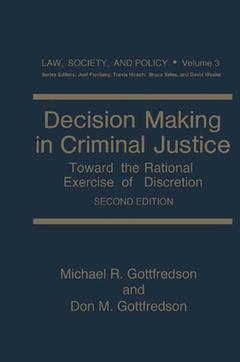Decision Making in Criminal Justice, 1988 Toward the Rational Exercise of Discretion Law, Society and Policy Series, Vol. 3
Langue : Anglais
Auteurs : Gottfredson Michael R., Gottfredson Don M.

The study of decisions in the criminal justice process provides a useful focus for the examination of many fundamental aspects of criminal jus tice. These decisions are not always highly visible. They are made, or dinarily, within wide areas of discretion. The aims of the decisions are not always clear, and, indeed, the principal objectives of these decisions are often the subject of much debate. Usually they are not guided by explicit decision policies. Often the participants are unable to verbalize the basis for the selection of decision alternatives. Adequate information for the decisions is usually unavailable. Rarely can the decisions be demonstrated to be rational. By a rationaldecision we mean "that decision among those possible for the decisionmaker which, in the light of the information available, maximizes the probability of the achievement of the purpose of the decisionmaker in that specific and particular case" (Wilkins, 1974a: 70; also 1969). This definition, which stems from statistical decision theory, points to three fundamental characteristics of decisions. First, it is as sumed that a choice of possible decisions (or, more precisely, of possible alternatives) is available. If only one choice is possible, there is no de cision problem, and the question of rationality does not arise. Usually, of course, there will be a choice, even if the alternative is to decide not to decide-a choice that, of course, often has profound consequences.
1 Overview.- 2 The Victim’s Decision to Report a Crime.- 3 The Decision to Arrest.- 4 Pretrial Release Decisions.- 5 The Decision to Charge.- 6 Sentencing Decisions.- 7 Correctional Decisions in the Community.- 8 Correctional Decisions in Institutions.- 9 Parole Decisions.- 10 Toward More Rational Decision Making.- Author Index.
Includes supplementary material: sn.pub/extras
Date de parution : 07-2013
Ouvrage de 308 p.
15.5x23.5 cm
Thèmes de Decision Making in Criminal Justice :
Mots-clés :
Crime; Criminal Justice; Institution; decision theory; election; exercise; information
© 2024 LAVOISIER S.A.S.



